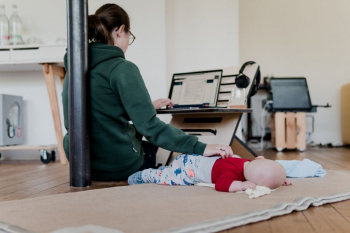Before covid many businesses were seeing an increase in the desire to work from home or remotely from employees. However, over the past year, many business owners have found themself in a tricky situation where all their staff have had to work from home whether they wanted to or not. While this way of working suits some people it is not a solution that works for everyone, employers and employees alike.
Working from home and working remotely has become so much more feasible in recent years with the improvements in technology however some employers are still hesitant about giving up their traditional office. It is also important to note that working remotely does not necessarily mean working from home or a coffee shop.
Staff Working From Home Vs Remote Working
A concern many employers have when it comes to staff working from home and remotely is the impact on their overall productivity. It is no secret that there are lots of distractions when working from home. Many employees (and employers) struggle to set clear boundaries between their working day and their home life. Let’s face it, we have all ‘just shoved on a load of laundry, gotten a ‘head start on dinner’ or taken that ‘longer lunch’ to spend with your partner or family. Put simply, working from home is not for everyone! Working remotely or being a ‘remote employee’ means that you are employed with a company but do not have to come into the companies office. Put simply this means an employee can work from anywhere they want.
Cons Of Staff Working From Home
Many employers cite a range of concerns and potential issues when it comes to their employees working from home or remotely. These include:
- The impact on productivity
- The dangers of distractions
- We have all been there, whether it is squeezing in some chores, having a long lunch or just the lack of a proper workspace so you have the chaos of children and/or pets not everyone finds this style of working from them.
- Lack of communication
- One concern employers have when it comes to the productivity of remote and home-based employees comes down
- Data Protection
- One of the biggest concerns many employers will have is that working from home may compromise important company and client data may be compromised
- Health and Safety
There is a common misconception that employers are not responsible for an employees health and safety when working from. However, this is not the case. It is also important to note that the Health and Safety Executive defines an employees health safety extends beyond just the physical including an employees mental wellbeing. In fact, employers have reported a 27% increase in employees reporting mental health issues. Regardless of whether an employee works in the office or from home the HSE guidance is the same with employers holding a significant proportion of the responsibility
Access To Technology and Resources
For an employee to work from home they will need the technology and software to do so. Obvious employee essentials for working from home include; cloud-based storage, laptop or computer and a phone. However, there are a wide array of other items and resources which may benefit an employee and employer alike.
Pros Of Staff Working From Home
Happier and more productive staff
Sometimes giving your staff a little bit more flexibility can make the world of difference. Whether it is eliminating the stress of the commute or simply getting away from nagging Nora the office manager most staff will relish having more control over their work environment. As they say:
“What works for one person will not necessarily work for the other”
This flexibility can be extended beyond simply where your staff work. For example, when working from home staff may be more willing to work less sociable hours or staggered hours which can be a significant benefit in our modern 24 hours culture.
Reduced overheads
It is a well-known fact that offices come with a range of associated expenses. However, through facilitating flexible and remote working for staff; a company can help reduce their overheads. For example, with less staff in the office at the same time, a company can downsize or rent out spare and unutilised office space. In turn, other expenses such as utilities, office furniture and other resources can be reduced or the cost can be shared.
Meet Me Halfway
Working from home does not suit everyone, whether they are an employer or an employee. However, the flexibility and range of benefits that working from home can offer are hard to ignore. However, it is possible to find a halfway point that benefits both employers and employees in the form of flexible and remote working.
In summary It is important to note that just because you can do something doesn’t always mean that you should. There will never be a solution that will suit everyone involved. These sort of decisions need to be balanced considering the staff’s needs and desires (bearing in mind they might not all agree) and the businesses objectives, industry and budgets.

